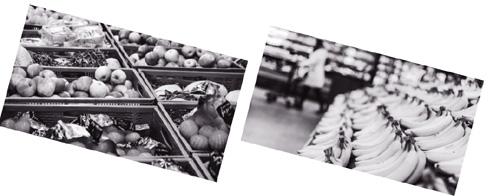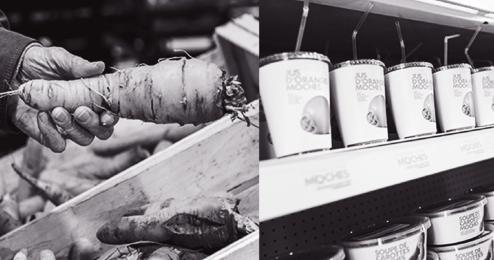法国控制食物垃圾之道
2018-05-22ByStoryHinckley
By Story Hinckley
France isnt an obvious frontrunner in food recovery, but new legislation has helped catapult the nation to the top of the 2017 Food Sustainability Index.2
France is a culinary3 leader—both at the table and, more recently, in the trash can.
In February 2016, France became the first country in the world to prohibit supermarkets from throwing away unused food through unanimously4 passed legislation. Now, supermarkets of a certain size must donate unused food or face a fine. Other policies require schools to teach students about food sustainability, companies to report food waste statistics in environmental reports, and restaurants to make take-out bags available.5
These laws “make it the norm to reduce waste,” says Marie Mourad, a PhD student in sociology at Sciences Po in Paris who has authored several reports on French food waste.6 “France is not the country that wastes the least food, but they have become the most proactive because they want to be the exemplary country in Europe.”7
Frances efforts have not gone unnoticed. The country earned top ranking in the 2017 Food Sustainability Index, a survey of 25 countries across Europe, the Middle East, Asia, and the Americas conducted by the Economist and Barilla Center for Food and Nutrition Foundation (BCFN)8.

The people of France wasted 234 pounds of food per person annually, according to the BCFN report, which is drastically better than Frances international counterparts, compared to about 430 pounds per capita thrown away per year in the United States.9
Small scraps10 make big impact
Food waste, or unused, edible11 food, is a global issue. Each year, some 1.3 billion metric tons, or one-third of all the food produced, is thrown away, according to the United Nations Food and Agriculture Organization.12 Recovering just 25 percent of that wasted food could feed 870 million hungry people—effectively ending world hunger.
Not only does food waste fritter away valuable resources like water, arable land, and money, but it also fills up landfills, which emit methane.13 If food waste were a country, it would be the third largest greenhouse gas emitter behind the United States and China.
“Food waste is so urgent because where and how we produce food has the biggest impact on the planet of any human activity,” says Jason Clay, senior vice president of food and markets at the World Wildlife Fund14.
“In the US, we dont have champions15 in government who are thinking much about food, nevertheless food waste,” says Mr. Clay.“That has separated us from France: they have people who took up this issue politically.”
However, France is not an obvious frontrunner in this field.
Over the past decade, Britain has demonstrated far more statistical success, says Craig Hanson, global director of food, forests, and water at the World Resources Institute, and Denmark has made news with new projects like ugly produce grocery stores.16 Comparatively, Frances law is new, and as the Guardian reported after it was passed, only 11 percent of Frances 7.1 million metric tons of wasted food comes from supermarkets.
But the law is important symbolically17. Neither the United States, nor Britain or Denmark, have comparable government legislation.
“Making it illegal for supermarkets to throw away food is massive,” says Jonathan Bloom, author of the book American Wasteland. “That legislative step has impacted all levels of the French food chain.”
Before the 2016 law, French supermarkets typically donated 35,000 metric tons of food annually, roughly one-third of food banks18 total supply, Jacques Bailet, president of the food bank network Banques Alimentaires, told the Guardian in 2016. If supermarkets can increase their food bank donations by only 15 percent this could mean 10 million more meals for needy19 French each year.
This law improves not only the quantity of donated food, say experts, but also the quality. Food banks typically are supplied with canned goods, rather than nutritionally valuable foods like meat, vegetables, and fruit.
“The fight against food waste should become a major national cause, like road safety, that mobilises20 everybody,” said Mr. Garot in a press release. “That implies that every authority, at every level, plays its part.”
1. curb: 控制,抑制。
2. frontrunner: 領跑者;legislation: 立法;catapult: 用弹弓射,使……一跃成为。
3. culinary: 厨房的,烹饪用的。
4. unanimously: 一致地。
5. 其他政策规定,学校需要教导学生食物可持续性的相关知识,公司需要在环境报告中进行食物垃圾数据统计,餐厅需要为食物提供外带包装。
6. norm: 规范,准则;Sciences Po: 巴黎政治学院(Paris Institute of Political Studies),法国著名学府之一,是一所位于巴黎市中心的世界著名的社科类大学,在欧洲乃至世界享有盛名。
7. proactive: 积极的,先发制人的;exemplary: 典范的,可作楷模的。
8. Barilla Center for Food and Nutrition Foundation (BCFN Foundation): 巴里拉食物与营养中心基金会,是一个非营利性非政府机构及多学科独立智库,主要分析经济、科学、社会和环境因素与食物的因果关系和影响因素,为提高食物可持续性提供解决方案。
9. drastically: 剧烈地,猛烈地;counterpart:相对应的人或物,对手方;per capita: 人均的。
10. scrap: 小块,碎片。
11. edible: 可食用的。
12. metric ton: 公吨(重量计量单位,等于一千公斤);the United Nations Food and Agriculture Organization: 联合国粮食及农业组织,是联合国系统内最早的常设专门机构。其宗旨是提高人民的营养水平和生活标准,改进农产品的生产和分配,改善农村和农民的经济状况,促进世界经济的发展并保证人类免于饥饿。
13. 食物垃圾不仅浪费了水、可耕种土地和钱财等宝贵资源,还会堆满垃圾填埋场,从而生成沼气,破坏环境。fitter away: 浪费;arable: 适于耕种的,可开垦的;methane: 甲烷,沼气。
14. World Wildlife Fund: 世界自然基金会,在全球享有盛誉的、最大的独立性非政府环境保护组织之一,致力于保护世界生物多样性及生物的生存环境,防止地球自然环境的加速恶化。
15. champion: 支持者,拥护者。

16. World Resources Institute: 世界资源研究所,是一个全球性环境与发展智库,致力于研究环境与社会经济的共同发展;ugly produce: 指那些卖相不好但可以吃的食材。
17. symbolically: 象征性地。
18. food bank: 食物银行,主要为经济有困难人士提供紧急及短暂的膳食援助。本句中Banques Alimentaires是法语的“食物银行”。
19. needy: 贫困的。
20. mobilise: 动员。
